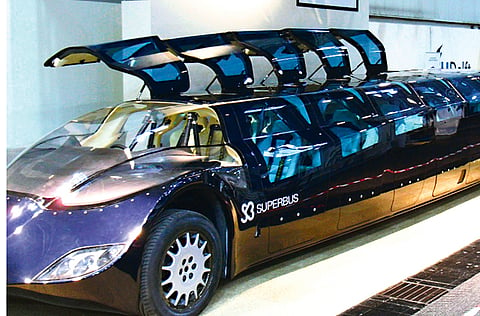It's a car. It's a limo. It's Superbus!
A unique initiative brings new meaning to commercial travel

Business executives could be commuting between Abu Dhabi and Dubai in the near future aboard an electric-powered luxury bus, taking them to their destination in comfort as fast as a high-speed train.
The Superbus is the brainchild of a design team at TU Delft University of Technology in Holland. It has been called the Dutch solution to the three ills of public transportation: congestion, pollution and safety.
Carrying 23 passengers at 250km/h on a dedicated ‘speed track', this crossover between a bus and a limousine is seen by its European designers as the shape of things to come in sustainable transport.
The design team will spotlight the Superbus project at this week's Commercial Vehicles Conference in Dubai. The idea is that it could become the choice of travel for commuters betweenthe business centres of Abu Dhabi and Dubai.
Multipurpose role
"The Superbus will tackle the challenges of mobility, spatial planning, service detail and environmental demands all in one," says Chief Designer Antonia Terzi, who will spotlight the Superbus in her address on sustainable mobility at the Commercial Vehicles Conference.
Offering the convenience of a car, the Superbus is 15 metres long and has eight doors on each side. It would run on a dedicated two-lane highway between Abu Dhabi and Dubai, and leave the "speed track" in urban areas to drop passengers at agreed locations.
Powered by lithium iron phosphate batteries, the 530bhp carbon fibre vehicle is similar in length and width to a public bus, but with the height of a conventional SUV. The Superbus, which uses rear wheel steering, boasts high manoeuvrability, formidable breaking power and safety based on the use of advanced radar and electronic obstacle detection systems.
The project is backed by the Dutch government as well as ten sponsors and 56 suppliers. A business study carried out by the Dutch government for a high-speed connection between Amsterdam and Groningen in the north of Holland, found the Superbus concept to be the best option in terms of infrastructure costs, impact on the environment and passenger numbers.
The Dutch designers, who plan to present the project to government authorities in the UAE, will use the Commercial Vehicles Conference to build interest from a major audience of industry buyers.
The conference runs alongside the Commercial Vehicles Middle East exhibition (www.commvehicles.com), taking place at Dubai International Convention and Exhibition Centre until Wednesday, bringing together the largest annual gathering of transport, fleet and logistics decision makers from every sector of the region's road transport business.
Among a panel of industry experts speaking at the conference, Antonia Terzi, the Italian former chief aerodynamicist of the BMW-Williams Formula 1 team, says an intelligent routing system is another key Superbus feature.
"Superbus does not have a fixed schedule," she explains. "Commuters book online or with their mobile phone, and the bus picks them up and drops them at their desired location."
The first Superbus road tests took place in Holland last September. Although no feasibility studies have been done yet for the Abu Dhabi-Dubai route, the similar Amsterdam-Groningen route has been studied by the Dutch government, with other high-speed connection routes currently under evaluation for several other countries around the world.



